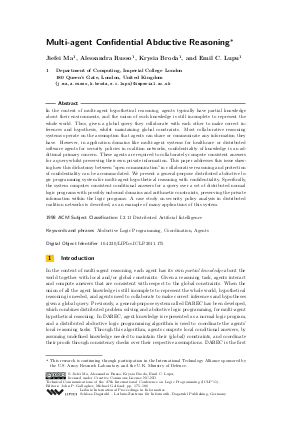Multi-agent Confidential Abductive Reasoning
Authors Jiefei Ma, Alessandra Russo, Krysia Broda, Emil Lupu
-
Part of:
Volume:
Technical Communications of the 27th International Conference on Logic Programming (ICLP'11) (ICLP 2011)
Part of: Series: Leibniz International Proceedings in Informatics (LIPIcs)
Part of: Conference: International Conference on Logic Programming (ICLP) - License:
 Creative Commons Attribution-NonCommercial-NoDerivs 3.0 Unported license
Creative Commons Attribution-NonCommercial-NoDerivs 3.0 Unported license
- Publication Date: 2011-06-27
File

PDF
LIPIcs.ICLP.2011.175.pdf
- Filesize: 479 kB
- 12 pages
Document Identifiers
Subject Classification
Keywords
- Abductive Logic Programming
- Coordination
- Agents
Metrics
- Access Statistics
-
Total Accesses (updated on a weekly basis)
0Document
0Metadata
Abstract
In the context of multi-agent hypothetical reasoning, agents typically have partial knowledge about their environments, and the union of such knowledge is still incomplete to represent the whole world. Thus, given a global query they collaborate with each other to make correct inferences and hypothesis, whilst maintaining global constraints. Most collaborative reasoning systems operate on the assumption that agents can share or communicate any information they have. However, in application domains like multi-agent systems for healthcare or distributed software agents for security policies in coalition networks, confidentiality of knowledge is an additional primary concern. These agents are required to collaborately compute consistent answers for a query whilst preserving their own private information. This paper addresses this issue showing how this dichotomy between "open communication" in collaborative reasoning and protection of confidentiality can be accommodated. We present a general-purpose distributed abductive logic programming system for multi-agent hypothetical reasoning with confidentiality. Specifically, the system computes consistent conditional answers for a query over a set of distributed normal logic programs with possibly unbound domains and arithmetic constraints, preserving the private information within the logic programs. A case study on security policy analysis in distributed coalition networks is described, as an example of many applications of this system.
Cite As Get BibTex
Jiefei Ma, Alessandra Russo, Krysia Broda, and Emil Lupu. Multi-agent Confidential Abductive Reasoning. In Technical Communications of the 27th International Conference on Logic Programming (ICLP'11). Leibniz International Proceedings in Informatics (LIPIcs), Volume 11, pp. 175-186, Schloss Dagstuhl – Leibniz-Zentrum für Informatik (2011)
https://doi.org/10.4230/LIPIcs.ICLP.2011.175
BibTex
@InProceedings{ma_et_al:LIPIcs.ICLP.2011.175,
author = {Ma, Jiefei and Russo, Alessandra and Broda, Krysia and Lupu, Emil},
title = {{Multi-agent Confidential Abductive Reasoning}},
booktitle = {Technical Communications of the 27th International Conference on Logic Programming (ICLP'11)},
pages = {175--186},
series = {Leibniz International Proceedings in Informatics (LIPIcs)},
ISBN = {978-3-939897-31-6},
ISSN = {1868-8969},
year = {2011},
volume = {11},
editor = {Gallagher, John P. and Gelfond, Michael},
publisher = {Schloss Dagstuhl -- Leibniz-Zentrum f{\"u}r Informatik},
address = {Dagstuhl, Germany},
URL = {https://drops.dagstuhl.de/entities/document/10.4230/LIPIcs.ICLP.2011.175},
URN = {urn:nbn:de:0030-drops-31736},
doi = {10.4230/LIPIcs.ICLP.2011.175},
annote = {Keywords: Abductive Logic Programming, Coordination, Agents}
}
